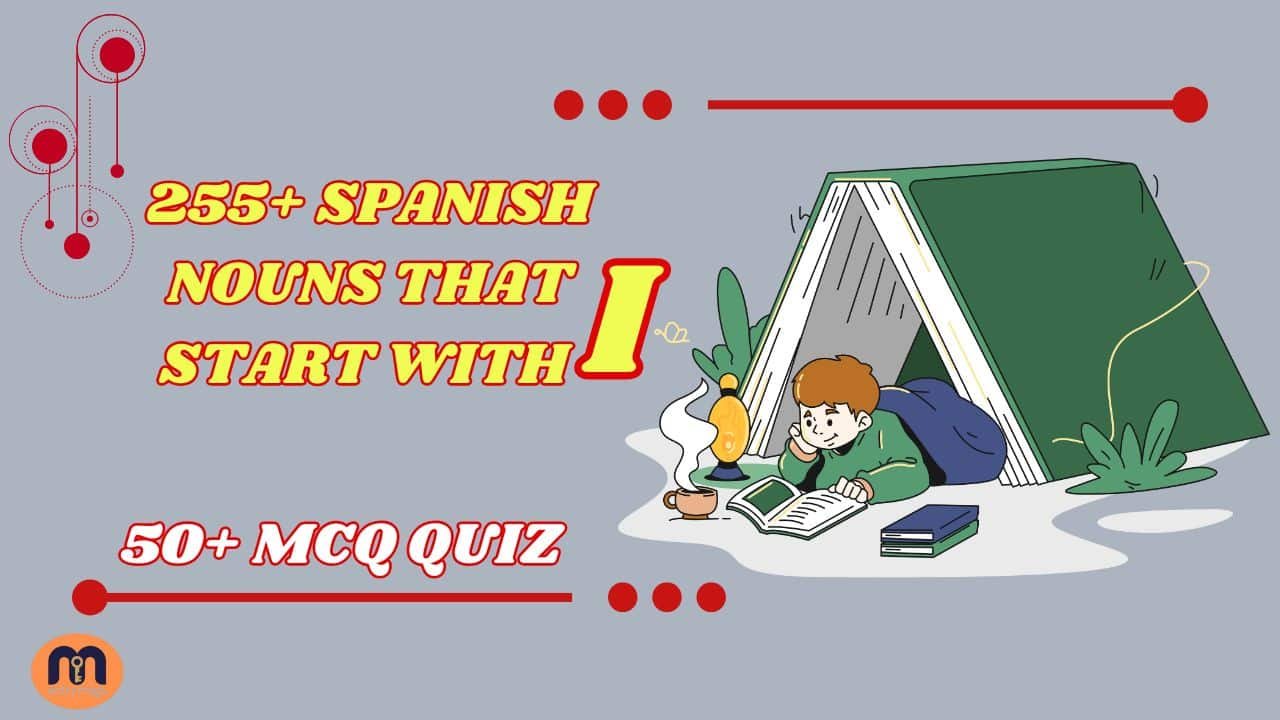Spanish Nouns That Start with I: Learning a new language can feel like both an exciting adventure and a daunting challenge.
Whether you’re a beginner or a seasoned Spanish speaker, expanding your vocabulary is key to mastering the language. One fun way to enhance your knowledge is by exploring nouns especially those that start with a specific letter.
If you’ve ever wondered about Spanish nouns that begin with the letter “I,” you’re in the right place. In this article, we’ll dive into over 255+ such nouns and provide you with helpful tips for incorporating them into your daily conversations.
Why Focus on Nouns Starting with “I”?
Spanish, like all languages, is rich with nouns that describe people, places, things, and ideas. The letter “I” may not be the most commonly emphasized letter, but it holds a variety of useful nouns across different categories. From everyday objects to abstract concepts, nouns that begin with “I” can significantly boost your vocabulary and comprehension.
Common Categories of Spanish Nouns Starting with “I”
Nouns that start with “I” span many categories. Below are some examples from diverse themes, each reflecting the depth and richness of the Spanish language.
People-Related Nouns
These nouns are helpful for describing individuals, occupations, and relationships.
- Iglesia (church)
- Imán (magnet; also, imam in religious contexts)
- Individuo (individual)
- Inspector (inspector)
- Intérprete (interpreter)
- Irracional (irrational person)
- Inventor (inventor)
Places and Locations
While not every place in Spanish-speaking regions starts with an “I,” there are several notable nouns in this category.
- Isla (island)
- Instituto (institute)
- Iglesia (church; also used in some place names)
- Itinerario (itinerary)
- Impresión (impression)
Objects and Things
Spanish is full of tangible items that begin with “I” everything from technology to tools.
- Instrumento (instrument)
- Imagen (image)
- Insecto (insect)
- Iglú (igloo)
- Inmueble (real estate/property)
- Inodoro (toilet)
- Impresora (printer)
Abstract Concepts and Ideas
Language is also rich in intangible ideas, and “I” nouns help you articulate more nuanced expressions.
- Inteligencia (intelligence)
- Inmortalidad (immortality)
- Identidad (identity)
- Imaginación (imagination)
- Inseguridad (insecurity)
- Ira (anger)
Food and Drink
Food lovers, take note! Spanish nouns for food and drink also include some that start with “I.”
- Iberico (a type of Spanish ham)
- Infusión (infusion, like herbal tea)
- Iced tea (té helado)
- Isla flotante (floating island, a dessert)
Technology and Gadgets
In today’s tech-driven world, Spanish has a variety of nouns that describe the innovations and gadgets we rely on daily. These words bring the language into modern conversations about electronics, internet culture, and more.
- Inmortalidad (immortality)
- Inteligencia artificial (artificial intelligence)
- Instalación (installation)
- Interfaz (interface)
- Inyección (injection, as in software update)
- Inalámbrico (wireless)
- Inventario (inventory)
- Instrumento (instrument, like tools or devices)
- Instrucción (instruction, in tech settings)
- Internet (internet)
Art and Creativity
Spanish-speaking cultures have a deep appreciation for the arts, from traditional crafts to contemporary creativity. “I” nouns play an important role in describing the artistic world, helping you articulate the beauty and complexity of human expression.
- Impresionismo (Impressionism)
- Ilustración (illustration)
- Instinto creativo (creative instinct)
- Imaginación (imagination)
- Icono (icon, as in art or media)
- Increíble (incredible)
- Intervención (intervention, in the context of art)
- Inédita (unpublished)
- Inspiración (inspiration)
- Intuición (intuition)
Architecture and Building
For anyone interested in architecture or the design world, Spanish nouns related to structures starting with “I” are crucial. These words help describe the built environment, from homes to skyscrapers, and everything in between.
- Inmueble (property/real estate)
- Infraestructura (infrastructure)
- Instalación (installation, architectural feature)
- Ícono arquitectónico (architectural icon)
- Intervención urbana (urban intervention)
- Imperio (empire, referring to monumental structures)
- Increíble diseño (incredible design)
- Inclinación (inclination, in design angles)
- Instinto de construcción (building instinct)
- Integrafía (geographic integration in architecture)
Feelings and States of Mind
In the realm of emotions, “I” nouns help articulate both the depths of human experience and the subtle intricacies of mental states. These nouns are key when discussing everything from love to anger.
- Ira (anger)
- Inseguridad (insecurity)
- Indiferencia (indifference)
- Inquietud (unease)
- Intolerancia (intolerance)
- Intención (intention)
- Inmortalidad (immortality, in a philosophical sense)
- Incredulidad (incredulity)
- Intuición (intuition)
- Indignación (indignation)
Nature and the Environment
From the natural world to environmental concepts, Spanish nouns beginning with “I” bring to life the beauty and complexity of nature. These terms can be useful in describing the landscapes, creatures, and ecological terms relevant to Spanish-speaking regions.
- Isla (island)
- Insecto (insect)
- Inundación (flood)
- Irrigación (irrigation)
- Iguana (iguana)
- Imágenes naturales (natural images)
- Infierno (hell, as a geographical or mythical term)
- Inclemencia (severity, as in weather)
- Impresión (impression, as in a landscape or view)
- Indio (Indian, relating to indigenous people or landscapes)
Science and Knowledge
For those with a passion for learning and intellectual pursuits, Spanish nouns starting with “I” in the field of science and education are indispensable. These words cover everything from knowledge acquisition to scientific concepts and research.
- Investigación (research)
- Inteligencia (intelligence)
- Inmunidad (immunity)
- Invencción (invention)
- Instrucción (instruction)
- Inducción (induction)
- Impacto (impact, scientific effect)
- Infinito (infinite, often used in mathematics and philosophy)
- Irracional (irrational, in logic or science)
- Índice (index, in scientific papers)
Food and Culinary Culture
Spanish-speaking cultures are rich with culinary traditions, and many nouns that begin with “I” are essential to discussing food and beverages. These words encompass ingredients, dishes, and the vibrant dining culture found across Latin America and Spain.
- Infusión (infusion, like herbal tea)
- Iberico (a type of ham from Spain)
- Isla flotante (floating island, a dessert)
- Indigestión (indigestion)
- Inca Kola (a popular soft drink from Peru)
- Inmortalidad (used metaphorically in some culinary contexts, like “immortal flavors”)
- Indio (corn, used in traditional cooking)
- Inocente (a term used for simple or unpretentious food)
- Instinto culinario (culinary instinct)
- Intoxicación (food poisoning)
History and Politics
Spanish nouns that start with “I” can also be used to describe key figures, events, and concepts that have shaped the history and political landscapes of Spanish-speaking countries. These words bring a sense of gravitas and importance to discussions of governance, political movements, and historical contexts.
- Imperio (empire)
- Independencia (independence)
- Inquisición (Inquisition)
- Integridad (integrity)
- Influencia (influence)
- Inmortalidad (immortality, often used in historical or political contexts)
- Intervención (intervention, as in foreign or political intervention)
- Indulto (pardon)
- Impuesto (tax)
- Injusticia (injustice)
Theater and Entertainment
In the realm of entertainment, nouns starting with “I” help capture the excitement, artistry, and creativity of performance. Whether it’s theater, music, or film, these nouns express the magic of the stage and the screen.
- Interpretación (interpretation, in acting or performance)
- Intérprete (performer, artist)
- Ilusión (illusion, as in magic or theater)
- Impacto (impact, as in performance impact)
- Intriga (intrigue, often in theater or novels)
- Impresión (impression, as in the emotional impact)
- Increíble (incredible, often used to describe a performance)
- Inmortalidad (immortality, referring to legendary artists)
- Independencia (independence, in the context of independent artists or movements)
- Ídolo (idol, as in a beloved performer or figure)
Philosophy and Thought
Philosophy and intellectual thought have an important place in any language, and Spanish is no exception. Nouns beginning with “I” are useful for discussing profound concepts, schools of thought, and philosophical discussions that challenge our understanding of existence.
- Intuición (intuition)
- Inmortalidad (immortality, often in philosophical discussions)
- Interpretación (interpretation, in the context of texts or theories)
- Irracionalidad (irrationality)
- Inconsciente (unconscious)
- Infinito (infinity)
- Identidad (identity)
- Ilusión (illusion, philosophical or psychological)
- Indefinición (indefiniteness)
- Interrogante (question, as in the search for answers)
Inventions and Discoveries
From life-changing inventions to ground-breaking discoveries, Spanish nouns starting with “I” are invaluable when discussing the world of innovation. These nouns capture the essence of human ingenuity and the quest for knowledge that drives progress.
- Invention (invention)
- Innovación (innovation)
- Investigación (research)
- Índice (index, in a scholarly or scientific context)
- Instinto (instinct, in the context of natural discoveries)
- Instalación (installation, in the context of new technologies)
- Integración (integration, particularly in technology and systems)
- Inteligencia (intelligence, often used in technological or scientific advancements)
- Inmortalidad (immortality, sometimes used metaphorically to discuss ideas that stand the test of time)
- Inmueble (real estate, as an industry that innovates with architecture and development)
Travel and Adventure
For travelers, explorers, and adventurers, Spanish nouns beginning with “I” reflect the excitement and wonder of discovery. These terms can help describe journeys, experiences, and the spirit of exploration.
- Isla (island)
- Itinerario (itinerary)
- Inmigrante (immigrant, someone traveling to a new land)
- Intervención (intervention, as in crossing borders or entering foreign lands)
- Inexplorado (unexplored)
- Infinito (infinite, referring to endless travel or possibility)
- Instinto (instinct, used in the context of travelers following their instincts)
- Inocente (innocent, as in the fresh eyes of a traveler experiencing something new)
- Independencia (independence, especially in terms of personal travel or liberation)
- Irritación (irritation, as in the discomfort travelers sometimes experience)
Conflict and Resistance
Spanish “I” nouns are also great for discussing conflict, struggle, and resistance, reflecting the resilience and strength of individuals and groups. Whether in historical contexts or modern-day struggles, these terms are powerful in articulating the challenges faced.
- Injusticia (injustice)
- Inseguridad (insecurity)
- Inmortalidad (immortality, used to describe struggles for lasting change)
- Inquebrantable (unbreakable, often used to describe resistance)
- Indignación (indignation)
- Insurrección (insurrection)
- Intransigencia (intransigence)
- Impunidad (impunity)
- Irracionalidad (irrationality, as in the senselessness of some conflicts)
- Inmenso (immense, used to describe the size of a challenge or obstacle)
Relationships and Social Interaction
Spanish nouns starting with “I” are also crucial for understanding and describing human relationships, whether it’s family, friendships, or social interactions. These nouns help us express the dynamics of connection and communication.
- Individuo (individual)
- Intimidad (intimacy)
- Interacción (interaction)
- Inocente (innocent, as in a person’s purity or trust)
- Inteligencia emocional (emotional intelligence)
- Implicación (involvement)
- Interés (interest, in the sense of mutual engagement)
- Incomprensión (misunderstanding)
- Influencia (influence, in terms of social or personal relationships)
- Incompatibilidad (incompatibility)
Gender and Cultural Diversity
Finally, Spanish nouns beginning with “I” are also vital when discussing gender, cultural diversity, and the various aspects of identity. These terms help articulate the experiences and identities of people from various backgrounds and walks of life.
- Identidad (identity)
- Inmigrante (immigrant, often used to discuss migration and cultural shifts)
- Incorporación (incorporation, in terms of diverse cultural inclusion)
- Iniciativa (initiative, often used to describe efforts for social inclusion)
- Irracionalidad (irrationality, sometimes used in discussions about prejudice or bias)
- Inseguridad (insecurity, often connected to marginalized communities)
- Independencia (independence, in terms of individual or national identity)
- Injusticia (injustice, often in discussions about equality)
- Incompatibilidad (incompatibility, used to describe cultural or ideological clashes)
- Interacción (interaction, used to discuss how different cultures and identities interact)
Success and Accomplishments
In discussing personal or collective successes, Spanish nouns starting with “I” can help express significant accomplishments, milestones, and achievements. Whether in professional life or personal growth, these nouns emphasize the value of overcoming obstacles and reaching important goals.
- Iniciativa (initiative)
- Inmortalidad (immortality, symbolizing lasting achievements)
- Independencia (independence, often marking a significant milestone)
- Influencia (influence, describing the impact of someone’s success)
- Innovación (innovation, as in groundbreaking achievements)
- Imposición (imposition, in the sense of exerting power or success)
- Implicación (implication, the resulting impact of achievements)
- Instalación (installation, used in the context of setting up new projects or businesses)
- Integración (integration, a successful accomplishment in social or professional integration)
- Inmueble (property, representing significant investments or assets)
Leaders and Role Models
The “I” category also holds powerful nouns to describe influential figures, leaders, and role models who inspire others to succeed, lead, and make meaningful contributions to society. These terms are central to discussions about great personalities in various domains, including politics, culture, and social movements.
- Ídolo (idol)
- Independiente (independent, referring to someone who works for their own vision)
- Impresario (entrepreneur, used in the entertainment industry)
- Intérprete (performer, often used to describe someone who interprets roles or art)
- Inmortal (immortal, used to describe legendary figures)
- Inspirador (inspirer, someone who motivates others)
- Integrante (member, someone who contributes to a team or movement)
- Institución (institution, used to refer to significant organizations or respected figures)
- Invencible (invincible, used for someone who consistently overcomes challenges)
- Intercesor (intercessor, someone who stands up for others in difficult situations)
Concepts in Culture and Philosophy
In every language, certain ideas and concepts become pillars of cultural or philosophical identity. Spanish nouns starting with “I” are rich with ideas that help define cultural values, thoughts, and worldviews. These nouns allow you to discuss the deeper, abstract sides of human existence, from belief systems to existential questions.
- Ideología (ideology)
- Infinito (infinity, representing boundless possibilities)
- Idealismo (idealism)
- Incertidumbre (uncertainty, a common philosophical concept)
- Intuición (intuition, often discussed in the context of knowledge or truth)
- Indiferencia (indifference, a concept often explored in philosophical debates)
- Intolerancia (intolerance, relevant in ethical and political discussions)
- Imaginación (imagination, central to creativity and art)
- Irracionalidad (irrationality, examined in logical or philosophical frameworks)
- Interpretación (interpretation, in understanding texts, meanings, or philosophies)
Social Movements and Activism
Spanish nouns beginning with “I” also highlight important terms related to social justice, activism, and movements for inclusion and equality. These nouns are vital for discussing efforts to change society and improve the lives of marginalized or underrepresented groups.
- Inmigrante (immigrant)
- Igualdad (equality)
- Injusticia (injustice)
- Inseguridad (insecurity, often in discussions about social justice)
- Indignación (indignation, a core emotion in social movements)
- Intervención (intervention, as in humanitarian or activist intervention)
- Integración (integration, especially in multicultural societies)
- Independencia (independence, often in the context of liberation movements)
- Irracionalidad (irrationality, sometimes used to describe unjust systems)
- Incomprensión (misunderstanding, often discussed in the context of cultural or racial tensions)
Nature and the Earth
The natural world provides an endless array of subjects to explore through Spanish nouns, especially those that start with “I.” These nouns help describe natural resources, processes, and phenomena that are essential to life on Earth.
- Isla (island)
- Insecto (insect)
- Imán (magnet, often related to natural science)
- Inundación (flood, used in environmental discussions)
- Irrigación (irrigation, crucial for farming and sustainability)
- Indígena (indigenous, referring to native peoples and cultures)
- Inmortalidad (immortality, often used symbolically in relation to nature’s cycles)
- Infusión (infusion, often used to describe plants or medicinal herbs)
- Increíble paisaje (incredible landscape)
- Instinto (instinct, often used to describe animals’ natural behaviors)
Landmarks and Monuments
In discussing significant physical structures, Spanish nouns that start with “I” help describe iconic landmarks and architectural feats. These terms offer a gateway into understanding how different cultures have shaped their environments through monumental creations.
- Ícono (icon, often used to describe landmarks)
- Inmueble (property, relating to real estate or historical buildings)
- Instalación (installation, used for exhibitions or monumental architecture)
- Imperio (empire, often used to describe vast territorial landmarks)
- Indicación (indication, often relating to historical markers or monuments)
- Intervención (intervention, in the sense of transforming spaces or landmarks)
- Inversión (investment, often used when discussing monumental projects)
- Impresión (impression, used to describe the impact of architectural works)
- Independencia (independence, symbolized through national monuments)
- Inmortalidad (immortality, as some structures are meant to last for centuries)
Festivals and Traditions
Spanish-speaking cultures around the world are known for their vibrant celebrations, from religious festivals to cultural traditions. “I” nouns in this category help describe important events, rituals, and the joy that comes with gathering as a community.
- Isla (island, often used to describe festivals on or around the water)
- Invitación (invitation, related to cultural events)
- Inmortalidad (immortality, in reference to traditions that last through time)
- Iglesia (church, often central to religious festivals)
- Inocente (innocent, used during celebrations like Día de los Inocentes in Spain)
- Independencia (independence, as in national holidays and celebrations)
- Interacción (interaction, describing how people come together during festivals)
- Influencia (influence, as in cultural exchanges during festivals)
- Ilusión (illusion, often related to the magic of festivals)
- Increíble evento (incredible event, used to describe standout celebrations)
Personal Growth and Development
Personal growth is a vital topic in language learning, and Spanish nouns beginning with “I” are great for articulating this journey. These terms can help you express the evolving nature of self-discovery, improvement, and reflection.
- Iniciativa (initiative, taking the first step toward change)
- Identidad (identity, often explored during personal growth)
- Inspiración (inspiration, the spark for personal development)
- Integridad (integrity, a key value in personal growth)
- Independencia (independence, often a milestone in personal journeys)
- Involucración (involvement, meaning engagement in self-improvement)
- Inmortalidad (immortality, often a symbolic reflection of lasting growth)
- Intuición (intuition, relying on your inner voice)
- Irracionalidad (irrationality, as a challenge to overcome)
- Incompletitud (incompleteness, the acknowledgment that personal growth is ongoing)
Key Adjectives That Pair Well with “I” Nouns
To deepen your understanding, it’s helpful to look at adjectives that complement Spanish nouns starting with “I.” These adjectives will enable you to describe the nouns more vividly. Here’s a list of adjectives commonly used with “I” nouns:
- Importante (important)
- Increíble (incredible)
- Intenso (intense)
- Inútil (useless)
- Irreversible (irreversible)
- Inocente (innocent)
- Inmenso (immense)
- Ideal (ideal)
- Inteligente (intelligent)
- Inmediato (immediate)
Fun Facts About Spanish Words Starting with “I”
Did you know that certain Spanish words starting with “I” are derived from other languages, adding to the global flavor of Spanish vocabulary?
For example, many technical terms related to the internet and modern technology have been borrowed from English but adapted to Spanish, such as:
- Internet (the same in both languages)
- Información (information)
Also, while many nouns starting with “I” appear similar in both Spanish and English, their pronunciation can be quite different.
Take “imagen” (image) for example it’s pronounced with a soft “i” sound in Spanish, unlike the English “i” which is often sharp and short.
Tips for Memorizing Nouns and Expanding Vocabulary
Mastering any set of vocabulary requires regular practice and reinforcement. Here are some practical tips for integrating nouns that start with “I” into your Spanish-learning journey:
- Flashcards: Create flashcards with the noun on one side and its English translation and a sentence example on the other. Review them regularly.
- Label your surroundings: If you’re trying to master nouns for objects, label items around your home or workspace with their Spanish names.
- Use language apps: Platforms like Duolingo, Babbel, or Anki can help reinforce these nouns through spaced repetition.
- Speak with natives: The best way to master new vocabulary is to put it into practice. Use these nouns in conversations with native Spanish speakers to help cement them in your memory.
Conclusion: Keep Exploring and Practicing
Whether you’re learning Spanish for travel, business, or personal growth, expanding your vocabulary will always serve as one of the most powerful tools at your disposal.
By starting with nouns that begin with the letter “I,” you’ve already taken a great step toward building a more robust language base.
As you continue your language learning journey, remember that every word learned brings you closer to fluency. Be patient, practice consistently, and soon you’ll be comfortably using hundreds of new nouns in everyday conversations.
Key Takeaways:
- Spanish nouns starting with “I” cover a wide range of categories, from people and places to objects and abstract ideas.
- Pairing nouns with relevant adjectives can enhance your communication and descriptive abilities.
- Regular practice, including speaking and using new vocabulary in context, is the best way to remember and master new words.
Keep exploring, and keep learning!
MCQ Quiz: Spanish Nouns That Start with “I”
1. Which of the following nouns related to technology means “artificial intelligence”?
- a) Inmortalidad
- b) Inteligencia artificial
- c) Instalación
- d) Intervención
Answer: b) Inteligencia artificial
2. Which noun from the article refers to a concept in the world of art and creativity?
- a) Infinito
- b) Impresionismo
- c) Influencia
- d) Inseguridad
Answer: b) Impresionismo
3. What is the meaning of the Spanish noun “Inmueble”?
- a) Property
- b) Invention
- c) Idea
- d) Injustice
Answer: a) Property
4. In the context of human emotions, which of the following terms means “anger”?
- a) Inseguridad
- b) Ira
- c) Indiferencia
- d) Inspiración
Answer: b) Ira
5. Which of these nouns refers to a “flood” in the natural world?
- a) Isla
- b) Insecto
- c) Inundación
- d) Imán
Answer: c) Inundación
6. Which noun describes the “immortal” nature of something legendary in history?
- a) Iniciativa
- b) Inmortalidad
- c) Integridad
- d) Instinto
Answer: b) Inmortalidad
7. In the realm of philosophy, which word describes “irrationality”?
- a) Intuición
- b) Irracionalidad
- c) Independencia
- d) Integración
Answer: b) Irracionalidad
8. Which noun is used in the article to refer to a cultural icon or landmark?
- a) Inmortalidad
- b) Ícono
- c) Influencia
- d) Impresión
Answer: b) Ícono
9. Which of the following refers to “insecurity” in a social or emotional context?
- a) Indiferencia
- b) Inmortalidad
- c) Inseguridad
- d) Inspiración
Answer: c) Inseguridad
10. The noun “Instinto” refers to which concept in the natural world?
- a) Instinct
- b) Invention
- c) Irrigation
- d) Influence
Answer: a) Instinct
11. Which noun is associated with a “musical or performing artist”?
- a) Inmueble
- b) Ídolo
- c) Intérprete
- d) Impresario
Answer: c) Intérprete
12. Which noun from the article describes a type of “island”?
- a) Insecto
- b) Isla
- c) Impresión
- d) Irrigación
Answer: b) Isla
13. In the context of social movements, what does “Independencia” refer to?
- a) Independence
- b) Influence
- c) Insecurity
- d) Influence
Answer: a) Independence
14. Which term is used to describe someone who is “involved” in a social cause or movement?
- a) Integrante
- b) Inmortal
- c) Inducción
- d) Influencia
Answer: a) Integrante
15. The noun “Iniciativa” refers to which concept in the realm of personal or professional achievements?
- a) Initiative
- b) Interpretation
- c) Indifference
- d) Independence
Answer: a) Initiative
16. Which of these terms refers to “invention” or “innovation” in technology or scientific fields?
- a) Invención
- b) Inmortalidad
- c) Inseguridad
- d) Infinito
Answer: a) Invención
17. Which noun from the article refers to “intolerance” as discussed in cultural or philosophical contexts?
- a) Inseguridad
- b) Intolerancia
- c) Injusticia
- d) Integración
Answer: b) Intolerancia
18. What is the Spanish term for “immigrant,” often used in discussions about migration?
- a) Independiente
- b) Inmigrante
- c) Impresión
- d) Impulso
Answer: b) Inmigrante
19. Which noun refers to “equality” in social justice discussions?
- a) Igualdad
- b) Irrigación
- c) Instinto
- d) Iniciativa
Answer: a) Igualdad
20. In the context of nature, which noun refers to a type of “herbal tea” or plant-based drink?
- a) Infusión
- b) Insecto
- c) Isla
- d) Inocente
Answer: a) Infusión
21. Which noun is used to describe a “tax” in political or economic contexts?
- a) Impuesto
- b) Intervención
- c) Impresión
- d) Ingreso
Answer: a) Impuesto
22. Which of these terms refers to the concept of “intelligence” in the realm of science or education?
- a) Irracionalidad
- b) Implicación
- c) Inteligencia
- d) Inquietud
Answer: c) Inteligencia
23. What does the noun “Intervención” mean in the context of history or politics?
- a) Interpretation
- b) Intervention
- c) Independence
- d) Influence
Answer: b) Intervention
24. Which noun refers to the “iconic” nature of certain individuals or structures?
- a) Inmortalidad
- b) Ícono
- c) Inseguridad
- d) Identidad
Answer: b) Ícono
25. What is the meaning of “Instalación” in an architectural context?
- a) Installation
- b) Interpretation
- c) Integration
- d) Influence
Answer: a) Installation
26. Which of the following nouns refers to “justice” in social or legal contexts?
- a) Inmortalidad
- b) Injusticia
- c) Integridad
- d) Independencia
Answer: b) Injusticia
27. Which noun describes a concept related to an “unexplored” area, particularly in geographical or scientific terms?
- a) Infinito
- b) Inmortalidad
- c) Inexplorado
- d) Institución
Answer: c) Inexplorado
28. What is the meaning of the noun “Intuición” in the article?
- a) Instinct
- b) Invention
- c) Intuition
- d) Independence
Answer: c) Intuición
29. Which noun is used to describe “involvement” in a social or personal matter?
- a) Implicación
- b) Independencia
- c) Irracionalidad
- d) Inspiración
Answer: a) Implicación
30. Which of these nouns is used to refer to “influence” in a social or political context?
- a) Inmortalidad
- b) Influencia
- c) Integración
- d) Imposición
Answer: b) Influencia
31. Which noun refers to the concept of “intervention,” particularly in political or social scenarios?
- a) Intervención
- b) Iniciativa
- c) Impuesto
- d) Intuición
Answer: a) Intervención
32. Which noun from the article refers to a person who has a “significant impact” in a given domain?
- a) Integrante
- b) Intérprete
- c) Influencia
- d) Invencible
Answer: c) Influencia
33. What is the meaning of “Inmortal” as used in the context of legendary figures?
- a) Invincible
- b) Invisible
- c) Immortal
- d) Incomplete
Answer: c) Immortal
34. Which noun is used to refer to “involvement” in a cause or activity?
- a) Inmortalidad
- b) Involucración
- c) Instinto
- d) Implicación
Answer: b) Involucración
35. Which of the following terms refers to “impression” as it relates to emotional impact or artistic influence?
- a) Impresión
- b) Inundación
- c) Iniciativa
- d) Intuición
Answer: a) Impresión
36. In terms of the natural world, which noun refers to an “island”?
- a) Instinto
- b) Isla
- c) Insecto
- d) Inmortalidad
Answer: b) Isla
37. Which noun refers to a “symbolic gesture” of forgiveness or clemency in legal or political contexts?
- a) Indulto
- b) Irracionalidad
- c) Instinto
- d) Imposición
Answer: a) Indulto
38. Which noun in the article describes “emotion” or “feeling” in a philosophical context?
- a) Inquietud
- b) Irracionalidad
- c) Inmortalidad
- d) Inspiración
Answer: a) Inquietud
39. What is the meaning of “Ídolo” in the context of culture or admiration?
- a) Individual
- b) Idealist
- c) Idol
- d) Imposition
Answer: c) Idol
40. Which noun refers to a “person’s identity” in cultural or personal discussions?
- a) Inseguridad
- b) Identidad
- c) Inmortalidad
- d) Impulso
Answer: b) Identidad
41. Which noun is associated with “inclusivity” and refers to the process of becoming part of a larger group or system?
- a) Integración
- b) Independencia
- c) Invención
- d) Irracionalidad
Answer: a) Integración
42. Which term is used to describe “the quality of being unbreakable” or “resilient” in the context of struggle or resistance?
- a) Invulnerabilidad
- b) Inquebrantable
- c) Implicación
- d) Inspiración
Answer: b) Inquebrantable
43. Which of these terms refers to “the ability to influence or control others” in the context of leadership or power?
- a) Imperio
- b) Integridad
- c) Infinito
- d) Irregularidad
Answer: a) Imperio
44. What does the noun “Instalación” refer to in the context of technology or infrastructure?
- a) Innovation
- b) Installation
- c) Implication
- d) Involvement
Answer: b) Installation
45. Which of these nouns refers to the feeling of “indignation” in response to perceived injustice?
- a) Inquietud
- b) Insensatez
- c) Indignación
- d) Inseguridad
Answer: c) Indignación
46. Which noun is used in the article to describe a “person’s involvement” in a situation or cause?
- a) Involucración
- b) Integridad
- c) Integración
- d) Invencibilidad
Answer: a) Involucración
47. What is the meaning of “Iniciativa” as used in the context of personal or professional action?
- a) Inspiration
- b) Initiative
- c) Inclusion
- d) Interpretation
Answer: b) Initiative
48. Which of these nouns refers to an “event” or “happening” in terms of its emotional or social impact?
- a) Iniciativa
- b) Increíble
- c) Impresión
- d) Indulto
Answer: b) Increíble
49. What is the meaning of “Indulto” in legal contexts?
- a) Innocence
- b) Tax
- c) Pardon
- d) Illusion
Answer: c) Pardon
50. Which noun is used to describe a “magic trick” or “illusion” in the world of entertainment?
- a) Influencia
- b) Ilusión
- c) Irracionalidad
- d) Interpretación
Answer: b) Ilusión
Read more knowledgeable blogs on Entry Mags

Shannon G. Johnson is a passionate writer and grammar expert, specializing in adjectives, verbs, and nouns. Through her blog, she simplifies complex grammar concepts, offering practical tips and clear explanations to help readers enhance their language skills. Shannon’s work is an invaluable resource for grammar learners of all levels.








